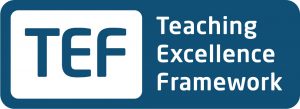
If anyone out there is anything like me, you might be a little baffled by the Teaching Excellence Framework and what it actually means, so I thought I’d do a little investigatory work and summarise my findings and thoughts. Staffordshire University has recently been awarded the ‘Silver TEF award’. This means that we are in the 50% of universities awarded Silver in England for 2017. 26% of universities were awarded Gold with the remaining either not taking part or being awarded Bronze.
The TEF awards are all about measuring teaching quality and excellence with an aim to give students insight into the quality of education they can expect from a particular institute. After looking a little more into the TEF, I was surprised to learn a few things. Firstly, the TEF is a means by which the HEFCE is abolishing tuition fee caps. Universities awarded Silver or Gold can charge their students more in fees to study (the justification being that you can expect to pay more for better quality education). As you can imagine, this has provoked some heavy criticism and I’m not sure it’s something I totally agree with either. Surely, this is going to cause problems down the line? Especially for disadvantaged students, who may only be able to afford a ‘Bronze’ university.
Secondly, the TEF has been criticised for not being a valid means of assessing quality. Gone are the days of inspectors assessing teaching quality during ‘OFSTED’ style inspections by the QAA. Those methods of measuring quality have been damned for not appreciating the breadth and unique learning and teaching of adults in Higher Education. The TEF uses ‘soft’ data to award levels of Gold, silver or Bronze and this soft data is mainly gathered from NSS results (Yes, that’s right….our NSS is that important!!). Data is also gathered from DLHE (the Destination and Leavers Survey) and information held about student retention from the Higher Education Statistics Agency. There are six core metrics all gathered from existing data and three of the metrics are gathered from NSS data alone!!
Gathering data wholly from these areas has produced some interesting results, which is changing the basis of university league tables nationally. Some well-regarded universities (who may depend on their historical reputations) have taken a blow with their TEF results and have attempted to appeal their awards. For once, the quality of education is being heavily based upon what the students report. You may see this as a good or bad thing, but personally I think this has got to be positive. After all, isn’t everything about the students and the education we offer them? Interestingly, the results have uncovered that at some of the well-regarded universities student satisfaction is low and as a result these institutions have been given a ‘red flag’ capping the level of TEF award which can be achieved. Quite disappointing for some, but I think it’s positive in terms of measuring real quality in education. It’s when you delve into these statistics you realise that we are in a good position at Staffordshire University. The face of a ‘great university’ is changing and its now through our students that we can become a better university. It’s the students who tell the world whether we are a good university, and now it seems the future of the ‘evolving’ league tables rest on what our students report in surveys like the NSS.
Our challenges exist around doing what we can to ensure that student experience is good, our NSS is continually improving and making sure our student retention is maximised with students remaining highly employable.
Lauren Philp, Lecturer in Midwifery, Lauren.Philp@staffs.ac.uk

